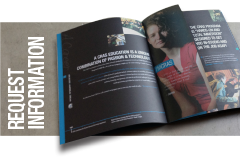Our website has moved, click here to visit our new site at CRAS.edu


FINANCIAL AID






The Conservatory of Recording Arts and Sciences Financial Aid: Code of Conduct
The Conservatory of Recording Arts and Sciences Financial Aid Office uses the following National Association of Student Financial Assistance Administrators (NASFAA) Statement of Ethical Principles and Code of Conduct to ensure the highest ethical behavior and professional practices. In addition, the Financial Aid Office Code of Conduct:- Bans revenue sharing arrangements
- Bans soliciting or accepting gifts (with certain exceptions such as meals and supplies at training events)
- Prohibits contracting arrangements by an employee in Student Financial Services regarding loans
- Prohibits requesting or accepting private loan funds in exchange for concessions with respect to Title IV loans
- Bans requesting or accepting call center or financial aid office assistance
- Requires an annual review
NASFAA Statement of Ethical Principles
Financial Aid at The Conservatory of Recording Arts and Sciences follows NASFAA’s Statement of Ethical Principles, which provides that the primary goal of the institutional financial aid professional is to help students achieve their educational potential by providing appropriate financial resources. To this end, this Statement provides that the financial aid professional shall:- Be committed to removing financial barriers for those who wish to pursue postsecondary learning.
- Make every effort to assist students with financial need.
- Be aware of the issues affecting students and advocate their interests at the institutional, state, and federal levels.
- Support efforts to encourage students, as early as the elementary grades, to aspire to and plan for education beyond high school.
- Educate students and families through quality consumer information.
- Respect the dignity and protect the privacy of students, and ensure the confidentiality of student records and personal circumstances.
- Ensure equity by applying all need analysis formulas consistently across the institution's full population of student financial aid applicants.
- Provide services that do not discriminate on the basis of race, gender, ethnicity, sexual orientation, religion, disability, age, or economic status.
- Recognize the need for professional development and continuing education opportunities.
- Promote the free expression of ideas and opinions, and foster respect for diverse viewpoints within the profession.
- Commit to the highest level of ethical behavior and refrain from conflict of interest or the perception thereof.
- Maintain the highest level of professionalism, reflecting a commitment to the goals of the National Association of Student Financial Aid Administrators.
NASFAA Code of Conduct for Institutional Financial Aid Professionals
An institutional financial aid professional is expected to always maintain exemplary standards of professional conduct in all aspects of carrying out his or her responsibilities, specifically including all dealings with any entities involved in any manner in student financial aid, regardless of whether such entities are involved in a government sponsored, subsidized, or regulated activity. In doing so, a financial aid professional should:- Refrain from taking any action for his or her personal benefit.
- Refrain from taking any action he or she believes is contrary to law, regulation, or the best interests of the students and parents he or she serves.
- Ensure that the information he or she provides is accurate, unbiased, and does not reflect any preference arising from actual or potential personal gain.
- Be objective in making decisions and advising his or her institution regarding relationships with any entity involved in any aspect of student financial aid.
- Refrain from soliciting or accepting anything of other than nominal value from any entity (other than an institution of higher education or a governmental entity such as the U.S. Department of Education) involved in the making, holding, consolidating or processing of any student loans, including anything of value (including reimbursement of expenses) for serving on an advisory body or as part of a training activity of or sponsored by any such entity.
- Disclose to his or her institution, in such manner as his or her institution may prescribe, any involvement with or interest in any entity involved in any aspect of student financial aid.
CRAS Grad
Career Opportunities
Career Opportunities
Recording engineer
- Music
- Soundtracks
- Music
- Soundtracks
Game audio designer
- Video games
- Apps
- Mobile audio
- Video games
- Apps
- Mobile audio
Live sound engineer
- Concerts
- Stage monitors
- Concerts
- Stage monitors
Radio production
- Location remotes
- Live radio
- Location remotes
- Live radio
Corporate media tech
- Hotels
- Conference centers
- Boardrooms
- Hotels
- Conference centers
- Boardrooms
TV/video scoring engineer
- Background music
- Voice over/narration
- Background music
- Voice over/narration
Movies
- Foley engineer
- Dialog replacement
- Sound effects
- Foley engineer
- Dialog replacement
- Sound effects
Manufacturer’s specialist
- Product rep
- Product specialist
- Product rep
- Product specialist
Environmental sound design
- Malls
- Airports
- Public spaces
- Malls
- Airports
- Public spaces
Live stage/theater sound
- Musicals
- Drama
- Lectures
- Musicals
- Drama
- Lectures
And more!
